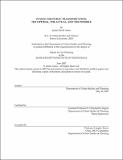Paying for public transportation : the optimal, the actual, and the possible
Author(s)
Antos, Justin David
DownloadFull printable version (1.523Mb)
Other Contributors
Massachusetts Institute of Technology. Dept. of Urban Studies and Planning.
Advisor
P. Christopher Zegras.
Terms of use
Metadata
Show full item recordAbstract
Passenger transportation poses challenges to American cities in the form of air pollution, traffic congestion, auto collisions, and barriers to mobility. Public transit has the potential to be part of a solution to these urban problems, yet transit agencies across the country clamor for more resources. Transit finance in the U.S. is heterogeneous, and rarely approached with a comprehensive view of transit's social benefits. This thesis suggests a framework for a more rational magnitude and incidence of public transit funding based on a more comprehensive view of transit's social benefits. I take up the case of the Chicago metropolitan region and quantify the transit system's major emissions, safety, congestion, and mobility benefits. Next, I survey and highlight current practices in transit finance from other cities in North America and Western Europe. Finally, I assess the size, structure, and distribution of burden of Chicago's current transit funding status quo against theoretical and practical principles of transit funding and offer a range of financing alternatives to solve the current fiscal crisis in Chicago. (cont.) I find evidence that the social benefits of public transportation in Chicago outweigh its costs, suggesting that preserving transit services there is justifiable. Transit's benefits accrue to a variety of jurisdictions in diverse and measurable ways which the current funding structure does not approximate. I find evidence that of the multiple beneficiaries of transit in the region, the subsidy structure in Chicago disproportionately benefits auto drivers who receive significantly more congestion benefits than they pay for. Last, I propose several policy options to increase public subsidy to transit in Chicago, and suggest that one particularly theoretically appealing alternative may be to establish tolls on existing roadways.
Description
Thesis (M.C.P.)--Massachusetts Institute of Technology, Dept. of Urban Studies and Planning, 2007. This electronic version was submitted by the student author. The certified thesis is available in the Institute Archives and Special Collections. :June 2007." Includes bibliographical references (p. 110-121).
Date issued
2007Department
Massachusetts Institute of Technology. Department of Urban Studies and PlanningPublisher
Massachusetts Institute of Technology
Keywords
Urban Studies and Planning.